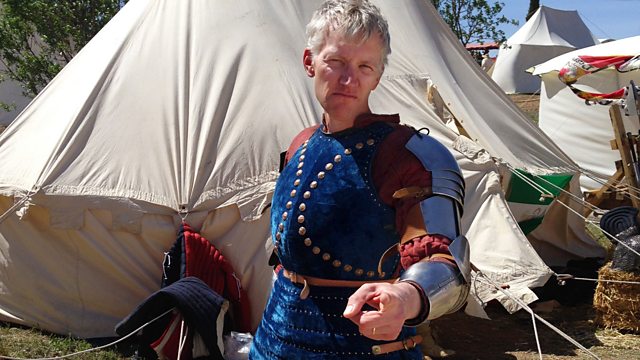03/03/2015
History magazine. Tom Holland, Dr Natalie Mears and Professor Mark Stoyle discuss politics at the court of Elizabeth I and the life and times of Civil War radical John Lilburne.
Helen Castor travels to New Hall near Chelmsford - home to the Earl of Sussex in 1579. New research by Dr Neil Younger at the Open University has uncovered a letter from one wealthy Norfolk landowner to another, describing a visit by Elizabeth and a dramatic performance in which Sussex makes clear his support for her marriage to the Catholic Duke of Anjou. Some who had entered the debate about Elizabeth's marital situation had been punished by her - so how did Sussex get away with this?
Professor Justin Champion visits the Bishopsgate Institute in the City of London to meet with the organisers of the Lilburne 400th, John Lees and Professor Ted Vallance. John Lilburne was possibly the most radical character in the English Civil War - a so-called Leveller who managed to fall out with both Charles 1st and Cromwell but still kept his head.
Producer: Nick Patrick
A Pier production for Βι¶ΉΤΌΕΔ Radio 4.
Last on
Web Links
Tom Holland takes the chair as historians and archaeologists come together to discuss issues and share the latest historical research.
Today: a recently discovered letter sheds light on how politics were often played out through drama at the court of Elizabeth; we mark the 400th anniversary of the 17th century radical John Lilburne and the biographer and Bronte expert Juliet Barker selects her inheritance books.
Joining Tom from the University of Durham is Β and from the University of Southampton .
Elizabeth at New Hall

Dr Neil Younger who works at the Open University has come across a letter from one wealthy Nor-folk gentleman to another which describes a visit that Elizabeth 1st made to New Hall near Chelmsford in September 1579. New Hall was the home of the Earl of Sussex. A privy councillor who was on the conservative, catholic wing of the establishment and someone who Elizabeth re-spected. The possible marriage of Elizabeth to the catholic Duke of Anjou was central to politics at this time and some feared that it would seriously upset the delicate balance between Protestant and Catholic that she sought.Β Β
The letter that Dr Younger has discovered shows that, through a spectacular drama put on for Elizabeth’s visit, Sussex was making clear his support for a marriage with Anjou. Furthermore, this bold statement comes only a matter of weeks before John Stubbs had a hand cut off for writing a frank-piece of anti-Anjou advice to the queen.
Helen Castor visited New Hall (now a school) in Essex to meet Dr Younger to find out how drama was used to make political statements and why Sussex could do this at a time when others were being punished for entering the debate
John Lilburne at his trial in 1649

Broadcast
- Tue 3 Mar 2015 15:00Βι¶ΉΤΌΕΔ Radio 4
Podcast
-
![]()
Making History
Popular history series where the past connects with the present.


